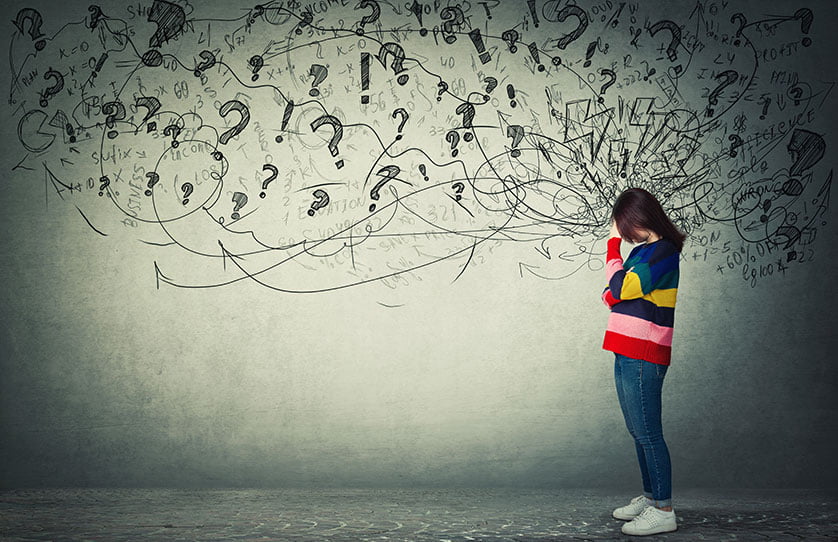Imagine your biggest fear, something that terrifies you to the core. Picture it in your mind, as if you are standing face-to-face with that fear.
Your heartbeat accelerates, its echo pounding in your ears. Your chest tightens under the crushing weight grip of an unseen force. You can’t breathe. Your mind begins to panic, lost in a fog of indecisiveness. You begin to perspire while your mouth is void of moisture. The lack of oxygen from your shallow breathing begins to make you feel dizzy. You’re certain this is the end.
Now, imagine feeling all of that, daily, triggered by normal everyday activities. That’s what it’s like for people with anxiety.
What is anxiety?
Anxiety is defined as intense, excessive, and persistent worry and fear about a situation. Most everyone has experienced some level of anxiety. Any number of stressful situations cause people to feel anxious -- a job interview, attending a new school, even meeting someone for the first time can stir up anxiety in just about anyone.
It’s normal to feel anxious about speaking in front of a large group or to worry about how you did on that test. Anxiety only becomes problematic if it impedes your ability to live your life. When someone becomes so consumed by the fear and worry, they may begin to avoid interactions or situations that could trigger the anxiety. This avoidance could begin to have a ripple effect on the person’s life, relationships, and responsibilities.
Acute anxiety versus chronic anxiety
Acute anxiety is the natural alarm of the body that alerts you to actual danger. The nervousness and worry you experience when driving in bad weather is an example of acute anxiety. Other examples of acute anxiety situations include stress from taking a test and worry experienced during a job interview. Once the threat (bad weather, test, interview) has passed, the feelings of anxiety and worry are gone. This is our body’s normal fight or flight response in action.
Chronic anxiety stems from the fear of what might happen if danger is encountered. The threat is anticipated as a possibility rather than an actual threat occurring. This type of anxiety develops from constant worries of the what if’s that our mind comes up with regarding the possible dangers that could occur versus the actual dangers experienced with acute anxiety.
What causes anxiety
Anxiety can be the result of a number of different factors or causes. Some anxiety inducing factors are preventable while others are caused by events or situations outside our control.
Environmental Factors
The largest group of factors that can cause anxiety are known as environmental factors. This includes interpersonal relationships, work and school stressors, financial hardships, emotional trauma resulting from: the death of someone close, natural disasters, victimization, or a traumatic event. Even experiencing low oxygen levels at high altitudes can cause symptoms of anxiety.
Genetics
Studies have found that a person’s genetics plays a role in the susceptibility of anxiety and the development of anxiety disorders. It is not uncommon to find that someone with anxiety or an anxiety disorder has a family history of anxiety.
Medical Factors
Anxiety has been identified as a side effect of some medications. It may develop as a symptom of a particular disease. In some people, anxiety comes from the worries of having a disease.
Brain Chemistry
Stress and trauma can cause changes or a rewiring in the brain that causes an overreaction to stressors. These changes can result in an imbalance of hormones and neurotransmitters that affect communication within the brain.
Drug use and withdrawal
The one fully preventable cause of anxiety is the one brought on by drug use or withdrawal symptoms from the stop of drug use. Certain substances increase feelings of anxiety and worry due to their effects on the brain chemistry. Anxiety can be prevented by avoiding the use of drugs and other mind altering substances.
Effects on the Brain
There are two parts of the brain that play key roles with regard to anxiety and the development of anxiety disorders, the amygdala and the hippocampus. The amygdala is considered to be the communication hub of the brain. It handles sensory processing and alerts the rest of the brain when a threat is detected.
The hippocampus is responsible for storing of memories. It is believed that fears based on emotional memories become stored in the hippocampus and are directly connected to the amygdala resulting in an ongoing cycle of anxiety from the stored memory.
It is important to understand the brain chemistry that takes place with regard to both acute and chronic anxiety. There are two chemicals involved, cortisol and norepinephrine. These stress hormones boost reflexes, perception, and speed and they cause the heart to pump faster. They are designed to kick the body into survival mode and keep us safe from danger.
Prolonged stress and anxiety, like that found in chronic anxiety conditions cause deterioration of the hippocampus and impairments to the prefrontal cortex. This degradation and damage to the brain has resulted in higher risk of developing depression and dementia.
What to do about anxiety
It’s clear that some anxiety can be expected in your day to day living and it’s normal to experience levels of worry when there is a threat of danger. There are multiple ways to cope and manage stress but the first step is identifying the source.
Gestalt psychotherapy helps identify the underlying cause of the anxiety and works from the premise that with awareness, we create choice. By identifying where the anxiety is coming from, talk therapy can help a person to work through the difficulties and interpersonal relationships that led to this state of anxiety.

